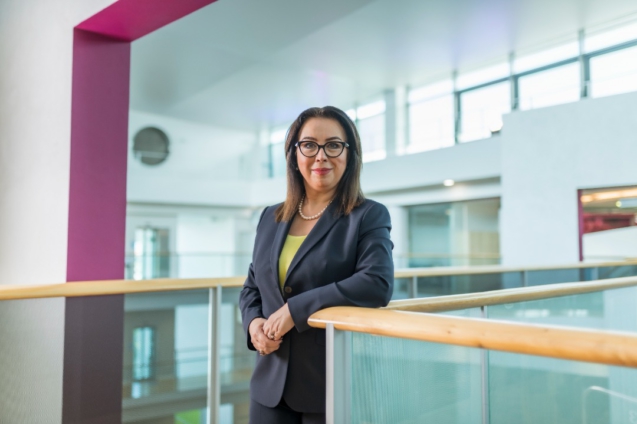When I was a young girl in Izmir, I never thought that I would someday become the Area Vice President of a multinational pharmaceutical company, leading a team of more than 2,500 colleagues who are making health happen for hundreds of millions of people across the Middle East and Africa region.
I knew I loved science and eagerly pursued my medical degree, qualifying as a psychiatrist. But it was only after I joined AstraZeneca in 2000 that the corporate world opened its doors to me, and I realised what women could achieve in the boardroom. Back then, the pharmaceutical industry was a male-dominated sector. I was the first Turkish woman to become an AstraZeneca Country President in Türkiye in 2014, a glass ceiling I was proud to break.
Twenty years on, AstraZeneca is a very different place. More than 50 per cent of our global workforce are women. Women now make up 38 per cent of our Board of Directors, 42 per cent of our Senior Executive team, and 48.1 per cent of senior middle management roles and above. We are on track to achieving gender parity at all levels across the organisation by 2025.
These figures are industry-leading but there is still so much more that needs to be done to make girls and women feel that they belong in science, technology, engineering and mathematics (STEM) careers.
Despite the fact that girls generally achieve better grades on average in STEM subjects than boys1, less than 30 per cent of STEM researchers are women.2 We know that women and girls are not held back by their abilities, but rather by social attitudes and inequitable access to education. According to the Malala Fund,3 the coronavirus pandemic has set girls’ education back even more; it is estimated that 20 million girls may never return to school after COVID-19.
To mark the International Day of the Girl (October 11), AstraZeneca is proud to join the global #GirlsBelongHere campaign, developed by Plan International, our partner in the Young Health Programme. The #GirlsBelongHere annual call-to-action was launched to tear down barriers of discrimination and prejudice that continue to hold girls back. It brings young women and girls into the boardrooms of companies around the world and provides them with a platform for their voices and opinions to be heard.
Over the first two weeks of October, girls and young women will step into senior leadership roles at AstraZeneca offices across the Middle East and Africa and spend time engaging with our leadership team. They will participate in 1:1 briefing meetings, manufacturing site visits, career mentoring sessions and team workshops, experiencing what it’s like to work at AstraZeneca.
As a science-led company, supporting the next generation of women and girls in STEM is a responsibility we are proud to carry. We remain committed to diversity and inclusion in the workplace, which includes promoting women in leadership.
Through our ‘She CAN’ initiative in Egypt, we are challenging traditional mindsets, and empowering women to stand on equal ground with their male colleagues through a cross-functional Women’s Council, development and empowerment programmes, leadership role modelling, workshops and other activities.
In South Africa, we are supporting the development and training of nurses and assistants at Unjani Clinic, a network of 100% black women-owned healthcare providers for under-served communities. We are also working with WEConnect International, an NGO that supports women-owned enterprises, to help us identify a more diverse pool of suppliers and support sustainable communities.
Earlier this year, AstraZeneca’s Near East and Maghreb office hosted the second edition of our Women’s Empowerment Summit in Tunisia, with the aim of honouring and empowering women within AZ and beyond.
And more than 500 colleagues across MEA have already enrolled in the AstraZeneca Women in Leadership Programme, which helps to build the capabilities of the next generation of female leaders and supports careers with lasting impact.
Occasions such as the International Day of the Girl give us pause to reflect on the role we can play in lifting up women and girls and making sure they can achieve their full potential. But this needs to be a year-round commitment. Through initiatives like these, I hope that we can inspire more young women to pursue STEM careers, making the field all the richer for it.
******
The writer is the Area Vice President, Middle East and Africa of AstraZeneca
Latest Stories
-
Ghanaian youth unaware of their right to hold politicians accountable – Youth Bridge Foundation
9 mins -
Judge delays Trump sentencing for a third time
26 mins -
2024 WAFCON: Ghana drawn against defending champions South Africa in Group C
54 mins -
Photos from DW-JoyNews street debate on ‘galamsey’
2 hours -
Mimmy Yeboah: Blending heritage with global sophistication, confidence redefined through couture
2 hours -
100 Most Influential People Awards 2024: Brain Hill International School’s Director Mary Anane Awuku honoured
2 hours -
Akufo-Addo commissions 97-km Tema-Mpakadan railway line
2 hours -
Majority requests recall of Parliament
3 hours -
Kanzlsperger and Professor Quartey support WAFA with medical Donation
3 hours -
Gideon Boako donates 10 industrial sewing machines to Yamfo Technical Institute
3 hours -
‘Golden Boy’ Abdul Karim Razak honored at WAFU-B general assembly
3 hours -
Buipewura Jinapor secures Vice Presidential position in National House of Chiefs with record votes
3 hours -
2024 election: I want results to come out like ‘milk and honey’ – Toobu
3 hours -
Ghana’s Henry Bukari hands over chairmanship of ECOWAS Brown Card Council of Bureaux
3 hours -
Residents of Dome-Kwabenya on edge ahead of December elections
4 hours

